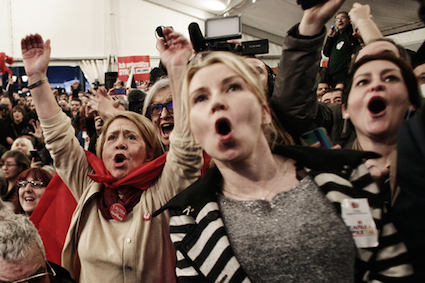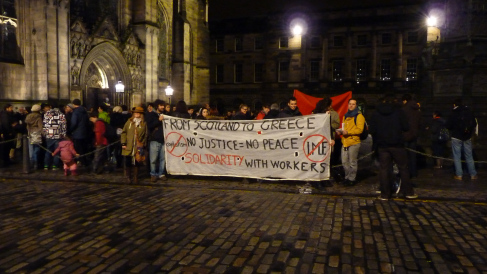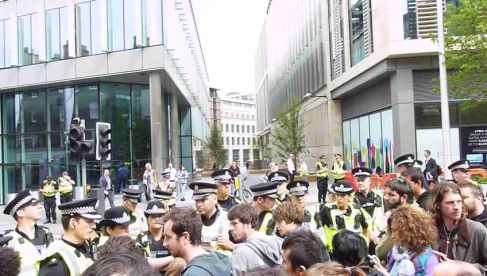Below we are posting an article by Paul Feldman from World to Win on Syriza’s election victory in Greece. This is followed by the leaflet produced by Real Democracy Now (Greece) which was handed out at the Radical Independence Campaign called demonstration at the Scottish Parliament on 14th February.
 The stunning victory of the anti-austerity Syriza in the Greek general election deepens the existing political crisis in Europe and throws into sharp relief the reactionary policies of Labour and other mainstream parties in the UK.
The stunning victory of the anti-austerity Syriza in the Greek general election deepens the existing political crisis in Europe and throws into sharp relief the reactionary policies of Labour and other mainstream parties in the UK.
This is the first time since the financial crash of 2007-8 and subsequent state bankruptcy of several countries in the European Union, that an electorate has had a clear choice.
Up until now, in Ireland, Spain, Portugal and Greece itself, all the parties contesting for power pledged to observe the harsh terms for bail-outs. Designed to prevent the euro from collapse, the draconian conditions were imposed by the hated Troika – the EU, the European Central Bank and the International Monetary Fund.
Now the Greeks have voted against the Troika and its supporting parties and for an end to austerity policies that have all but destroyed the country’s economy, health service and education system. Homelessness, starvation and destitution have become a common feature in Greece.
Fresh from his visit to Saudi Arabia to offer condolences on the death of the despotic, feudal king, UK prime minister David Cameron summed up the fears of the European political elite when he Tweeted: “The Greek election will increase economic uncertainty across Europe.”
So much for the will of the people. Clearly, he prefers the Saudi ways of passing power from one monarch to another.
Syriza, a coalition of various left groups and the Greens, led by former Communist Party member Alexis Tsipras who will become prime minister, has pledged to halve the country’s £190 billion foreign debt, renegotiate better terms on the rest and reverse some of the previous government’s austerity measures. Syriza is pledged to stay in the eurozone, however.
“The sovereign Greek people today have given a clear, strong, indisputable mandate,” Tsipras told a crowd of rapturous flag-waving party supporters. “Greece has turned a page. Greece is leaving behind the destructive austerity, fear and authoritarianism. It is leaving behind five years of humiliation and pain.”
This open appeal to nationalist sentiment may have won Syriza votes in a country essentially governed by the Troika but will not help when it comes to policies. It does help explain, however, Syriza’s unhealthy infatuation with the arch-opponent of the EU, the authoritarian president Vladimir Putin, who has been praised by a leading party member for making Russia “great again”.
Those who voted for Syriza are expecting big things. One voter told the Guardian: “I just voted for the party that’s going to change Greece; in fact, the party that is going to change the whole of Europe,” said Panagiotis, 54, a self-employed electrician. “There has to be change, big change. The economy has collapsed … Syriza is Greece’s hope.”
The Troika has rushed to defend its position and understands that its whole project of European integration based on the euro is at stake. In other words, the future of the EU as a major capitalist trading block is involved.
If the new Greek government stands firm, and is unable to meet its bail-out repayments for lack of funds, there is the real possibility that the country could be ousted from the euro. EU bureaucrats have a term for this – Grexit.
“Grexit is unthinkable,” said one senior Brussels policymaker involved in the negotiations. “It would be extremely bad. Europe is about irreversibility. If you start doubting that, you start pricing in the risk of fragmentation and soon you have no monetary union. The only chance of Grexit is if Greece defaults on its payments. Morally, that would be saying they want to leave.”
A default would trigger a run on the banks, capital flight and capital controls in Greece itself.
The key to the negotiations, naturally, are the Germans and a spokesman for the ruling CDU/CSU parliamentary group, was adamant that “Syriza shouldn’t expect Germany to renegotiate with the programmes. They have to stick with what the former government has promised”.
 As the inevitable confrontation develops between the Greek people and the EU, it is fair to say that ending austerity around Europe involves more than renegotiating harsh bail-out terms. Even countries that haven’t borrowed heavily are imposing the burden of the crisis on their own people.
As the inevitable confrontation develops between the Greek people and the EU, it is fair to say that ending austerity around Europe involves more than renegotiating harsh bail-out terms. Even countries that haven’t borrowed heavily are imposing the burden of the crisis on their own people.
In the UK, the ConDem coalition has carried through a massive programme of cuts and depression of wages that has impoverished large sections of society. Inequality is at an all-time high. This is the price we are told to pay for a crisis of capitalism that is not of our making. Unlike in Greece, at the coming general election there is no real choice. All the major parties are committed to austerity.
Is it possible to “end austerity” and return to some supposed golden age of capitalism that was a little fairer? The answer is clearly no. Only yesterday, the governor of the Bank of England Mark Carney warned of a “liquidity storm”.
He told an elite group of bankers in Davos: “We are particularly concerned about an illusion of liquidity that has existed in a number of financial markets. I would say that illusion of liquidity is gradually being disabused,” he said, adding that the so-called ‘flash crash’ in the US Treasury market last October was a wake-up call even if the ‘bouts of losses’ have been small so far.”
In other words, the financial crisis – which is a reflection of deeper economic problems relating to a continuing recession – is taking new forms and could once again shatter the global economy.
This is the reality against which the populist Syriza takes power. Appeals to national pride won’t be enough. A dismantling of the corrupt and dangerous Greek state must be on the agenda because it will seek to undermine Syriza at every turn.
Equally, we must ensure that the Greek people are not isolated in their battle against a corporate EU. The Greek election has to be the start of a movement for real democracy throughout Europe.
That must inevitably lead to democratic control by the people and for the people of the economy and the financial system and an EU that is not a plaything of the corporations. Assemblies for Democracy are planned in London and Manchester this spring. Do your best to be at one.
Paul Feldman
Communications editor, World to Win
26 January 2015
See more at: http://aworldtowin.net/blog/Greek-voters-reignite-the-flame-of-democracy.html#sthash.kzKjgrHv.dpuf
_____________
STATEMENT FROM REAL DEMOCRACY NOW (GREECE)

What has been happening in Greece since the beginning of the austerity packages in 2010 which were implemented by the former Greek governments as a prerequisite for receiving loans can only be described as catastrophic: the huge reduction of wages, the drastic increase of unemployment and suicide rates, the dismantling of the public health infrastructure constitute a humanitarian crisis. This was followed by a crisis of democracy with the erosion of national and popular sovereignty in a country ruled by presidential decrees according to the troika dictates, whilst riot police and neo-nazi gangs savagely attacked protestors and immigrants, amidst a rise of far right conservatism.
In this context, the recent SYRIZA electoral victory has undoubtedly revived people’s hope for social justice even if it was forced to go into a coalition with the nationalist, racist and homophobic “Independent Greeks”. But although the first moves of the new government, albeit mostly symbolic, inevitably winning in the comparison with the previous neoliberal governments of New Democracy and PASOK they should not be seen as the panacea and saviours of the Greek people that will fix their lives for them. In other words, although that “air of hope” blowing over the country has once again inspired hundreds of thousands to take the streets and squares, people need to realise that they are the ones to drive social politics to the left.
The day after the elections but even before that, the same EU institutions that have been involved in various economic scandals have been claiming the very last drops of blood from the Greek people in collaboration with the Coalition government of ND/PASOK immediately showed their true face by hurling threats and blackmails.
Whether the new government can implement policies, which will be in the interest of the people, while acknowledging the debt and within the constraints, set by the EU treaties and the common currency, is a matter of debate amid the Greek people, the interior of SYRIZA itself and the left inside the country and internationally. What seems certain however is that it will not be possible without a frontal collision with those greatly benefiting from the current situation: the bankers, the multinationals, the international and Greek oligarchy and their mouthpieces. It is naïve to believe that they will voluntarily give up their profits simply because a left wing party won the Greek election.
This is why the recent mobilization of people is so promising and its continuation and deepening is necessary: both in order to put pressure on the government to fulfil its pre-election promises (and to go beyond them) and to defend it if it does.
What is at stake is much more than the future of Greece – the fight for Greece is only part of the fight for a different Europe, a different world. A Europe, which isn’t run by lobbyists, multinational executives and unelected bureaucrats, which doesn’t promote war and racism and on whose closed borders thousands of asylum seekers, don’t find their death. A world in which people don’t suffer in favour of profit. A society based on the needs of the people without exploiters and exploited. This society won’t be won simply by an electoral result. It must be won through the social struggles, in the assemblies, the streets and the picket lines.
Real Democracy Now (Edinburgh), 14.2.15
See the Real Democracy Now (Edinburgh) blog at:-
https://realdemocracynowedinburghgr.wordpress.com/
and the coverage of the international solidarity on November 14th, 2012
and the demonstration against George Papandreou’s visit to Edinburgh at
b) https://realdemocracynowedinburghgr.wordpress.com/tag/demonstration/
supported by RCN (Edinburgh) and Edinburgh RIC supporters


